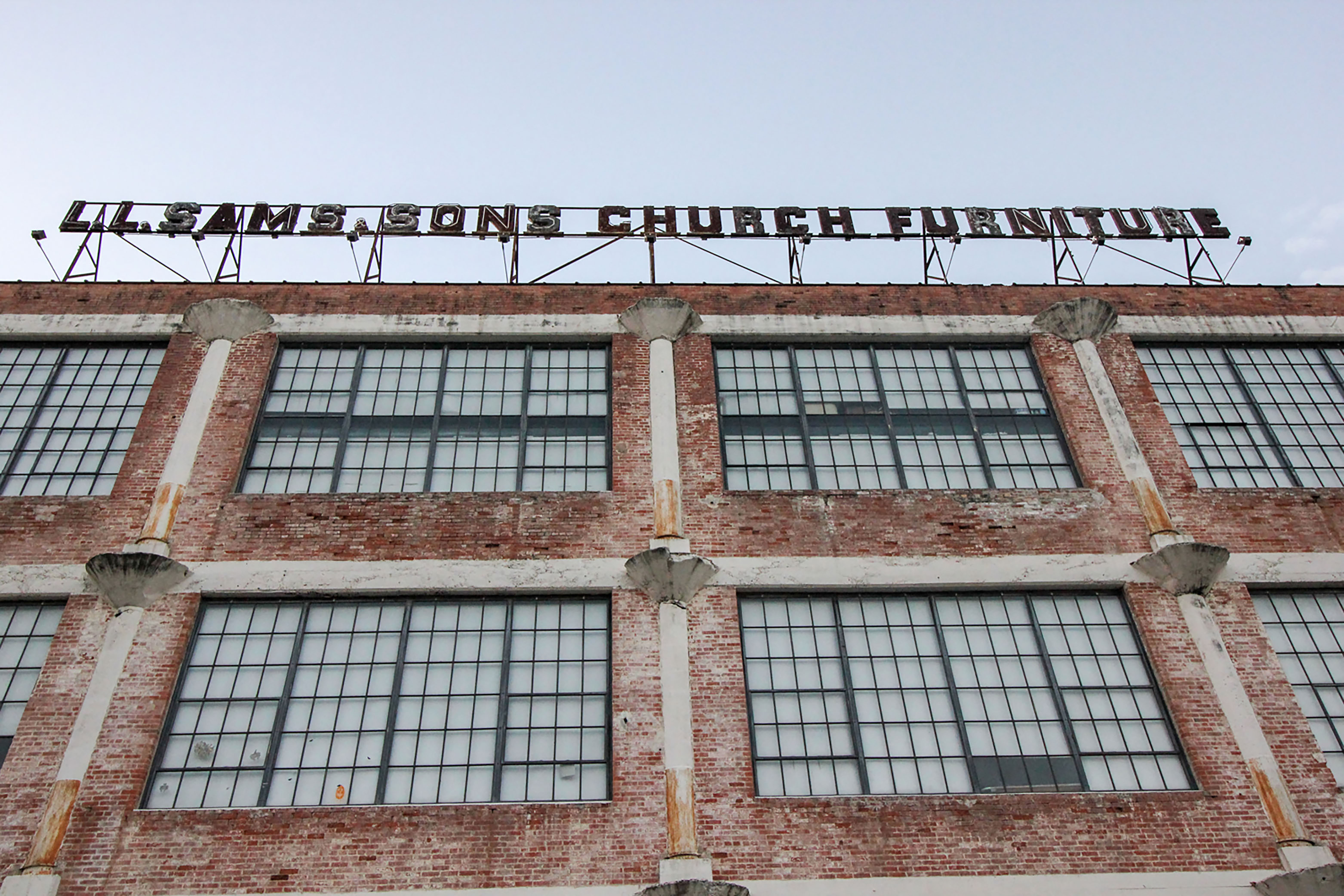 Story by Daniel Smith; Photos by Hannah Johns
Story by Daniel Smith; Photos by Hannah Johns
Located off of LaSalle Avenue and First Street, L.L. Sams Historic Lofts was purchased in 1947, nearly a half-century after the Reverend L.L. Sams of Whitney set out upon a modest business venture that would mature into a multimillion-dollar mammoth of furniture supply. Sams’ initial goal was to help local Texas churches furnish their interiors. Indeed, most nearby churches needed the improvements. Sams had no shortage of clientele in these early decades. He oscillated between holding a fixed salary and earning commission on behalf of the northern factories he represented, but the latter position best accommodated his preacher’s lifestyle. A 1952 volume of Baylor Business Studies lists his motivations for entering the industry: his income was not enough to support his family; he believed congregations should enjoy beautiful and inviting worship areas; and he wanted to give his children a Baylor University education. His son Ross joined the company in 1920, the same year it expanded beyond its mail-order roots and encompassed real-time manufacture. Sams valued the idea of a family business – his wife tended to the books, and their first secretary wasn’t hired until 1922, when the Sams’ household and business operations relocated to Houston. Ross’s brother Rowe came aboard in 1924, and in 1927 the two sons took charge of the company.
Then the Depression hit, and the next 10 years almost killed their enterprise. Rowe Sams bowed out, leaving Ross and a staff of one to weather yearly grosses of less than $1,400. The Texas oil boom, however, provided enough statewide economic stimulus to keep small businesses like L.L. Sams from tanking. By 1940, Rowe had returned and sales had improved. With eyes toward further expansion, Ross and Rowe integrated service and delivery under the guarantee of a single payment. Soon after, an interested party approached the brothers, agreeing to buy in on the condition that his church be ready that very Sunday. Rival contractors demurred, one competitor scoffing that it was at least a nine-month job, but Ross and Rowe Sams followed through, and their work was peerless. They brought with them this ethos of determination which had broadened their influence to more than 20 states. Through their leadership, their doggedness, and their networking savvy, these two brothers had propelled their father’s pet project into the stratosphere. Appalachian Oak lumber from the eastern U.S. was shipped to Waco, where it was transformed by fine craftsmanship into pews, pulpits and tables. In its final decade, L.L. Sams & Sons deviated from its church market, ultimately agreeing in the 1990s to a merger with Royal Seating Corp., which is now a trademarked brand of School Specialty Inc.
Turning from LaSalle Avenue onto 1st St., guests are greeted by the old factory’s distinctive lettering, held aloft after so many decades by nine triangular braces and transverse beams – LL Sams & Sons Church Furniture. The residents’ swimming pool glimmers a soft beryl blue. Steady flows of saltwater drop unobtrusively from two repainted cane-shaped pipes, sunlight playing off their lambent little plash. The property owner, Crystal Metz, comments on how easily it catches the eye. “It’s one of the first things people notice,” she says. Both Metz and her assistant agree that the pool dates back no further than the early 2000s.
Toward the Lofts’ office building are corrugated iron roofs, exposed networks of tarnished copper, industrial sheds once housing timber and tools and perhaps the smell of formaldehyde resin glue. Everything in sight, old and new, coalesces gracefully.
Certain hallways terminate in thick steel fire doors perpendicular to where you came from. They’re still on rollers, but good luck getting them to budge. The clear-coated wood floors…the cement walls…towering vertical pipework thicker than a live oak tree, sometimes fully exposed, sometimes protruding from the walls…all of these elements are authentic fragments from the old family company. The apartments themselves, which can accommodate up to eight tenants, exhibit the same sort of tasteful industrial bricolage. “Our goal here is to make it very homey,” says Metz’s assistant. Metz nods, also stressing how she hopes to organize more Lofts-wide communal events. For her, the residents and their involvement are key to L.L. Sams’ future as a sustainable piece of Waco history. She already spearheads weekly get-togethers like Taco Tuesdays and Do-Nut Know What We Would Do Without You Fridays. “It is at these events,” she says, “that we are able to say thank you and build a familial atmosphere. We let our residents know we are here to help make their stay with us the best it can be and are sad to see them leave when they must move forward.” Despite her new role as manager in 2016, Metz is no stranger to L.L. Sams (she worked under the property’s prior manager). “I love it,” Metz says. “We really love our residents.” When asked how she feels about implementing further changes, again her perspective hinges on the Lofts community: “I want to hear my residents’ feedback. I want to know what makes them happy. As for changes, it depends on what they think needs to change. If there is something, I’m open to it. Other than that, just little exterior updates here or there.”
No two apartments share the same blueprint, but their commonalities, convey the sense that every room is kindred. At heart, these apartments are templates primed for the individual touch. Their antiquity is no impediment to imagination, and Metz corroborates their value as figurative and literal canvases. “We allow you to paint the walls,” she confides. She pauses, grins, and adds: “We actually encourage it!”
